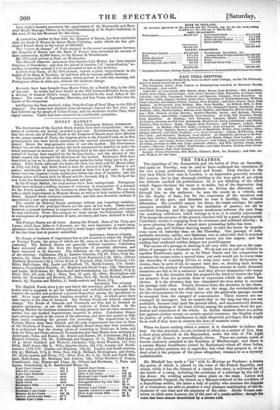THE THEATRES.
The repetition of the Sonnambula and the ballet of Theft on Saturday, and again on Tuesday, may be said to have confirmed the reputation of the two young performers, Gardoni and Rosati. That Gardoni is the very best Elvino ever seen in London, is an impression generally avowed. His success lies in that thorough yielding to the true spirit of art whiolt has hitherto marked his performance: he is not thinking of the effect which Signor Gardoni the tenor is to make, but of the impression that ought to be made by the incidents on Elvino the character, and through him on the audience: he uses the music as a vehicle, not for the display of feats, but for the expression of the emotions and passions of the part; and therefore he uses it forcibly, but without affectation. His youthful aspect, his dress, his rustic carriage, his naive manners ennobled at times by the exaltation of passion, are all in excellent keeping; and his ingenuous tenderness redeems the part from the sneaking selfishness which belongs to it as it is usually represented. If he keeps the promise of the present, Gardoni will be a great singing actor. Castellan's Amines is engaging From its sweetness and subdued chastity: It is more pleasing than that of much more pretending ladies has been.
Rosati's gay and brilliant dancing seemed to take the house by surprise even more on Saturday than on the Thursday. One passage, of inde- scribable dexterity, agility, and lightness, was so admirable that it extorted a peremptory encore, and then a second encore not less urgent: and her smiling face confessed neither fatigue nor unwillingness.
The encore of a passage in dancing is all very well; but not so the repe- tition of' passages in a dramatic work. We do not use to call on Othello to smother Desdemona again, or on Sir Peter Teazle and his companions to rehearse the screen scene a second time: yet such would not be worse than the absurdity of requiring Elvino to resay once more his declaration to Amine, that, in spite of all, he cannot hate her; or, fetching back Amine, to reendure the ecstacy of reconciliation. These encores in really dramatic situations are felt to be a nuisance; and they always disappoint—for many reasons. It is the situation that has prepared the mind to receive the high- est pleasure from the peculiar form of expression which the author has chosen. It is the situation that has stimulated the true artist to execute the passage with effect. Totally divorced from the situation, in the cham- ber, the repetition may not offend; but on the stage, the verisimilitude of all the circumstances is the very reason why the particular passage cannot be excepted from the category of consistencies. These encores are en- couraged by managers; but we suspect that in the long ran they are not profitable, because they spoil the general effect, and unconsciously detract, even in the feelings of the least critical among the audience, from the per- fection and enjoyment of the whole. In Italian theatres there is a police law against encores except on certain special occasions: the English would be jealous of police interference in their theatrical privileges, but it might be as well if they were to observe the laws of common sense.


























 Previous page
Previous page